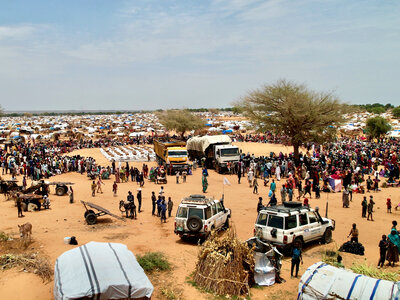Emergency
Sahel
- 10 million
- people suffer acute hunger
- 3.5 million
- people in Burkina Faso, Mali and Nigeria are trapped in besieged areas
- US$174.7 million
- needed for WFP operations up to July 2026
The conflict in the Sahel is upending lives and livelihoods and forcing more people to flee in desperation. The climate crisis, conflict, inter-communal tensions, declining agricultural production and global economic downturns that increase food and fuel prices are the major drivers of hunger in Central Sahel – including Burkina Faso, Chad, Mali and Niger.
Escalating violence in Burkina Faso, Mali and Niger has driven hundreds of thousands of refugees across the border, seeking safety in coastal countries. This makes West Africa one of the fastest-growing displacement crises in the world.
An estimated 3.5 million people In Burkina Faso, Mali and Nigeria remain trapped in besieged areas and are cut off from assistance. Access to besieged areas is one of the greatest challenges humanitarian workers face.
Ongoing insecurity in Niger, along with low agricultural productivity, climate shocks and volatile markets, is driving up hunger and humanitarian needs – which had already hit unprecedented levels in recent years.
All forcibly displaced people in Central Sahel need urgent, life-saving assistance. Most of them are hosted by communities who are themselves often deprived and extremely vulnerable. Food needs are inexorably on the rise, at a time when humanitarian access is becoming increasingly challenging.
The World Food Programme (WFP) couples life-saving humanitarian response with an integrated package of activities that shore up livelihoods, restore ecosystems, create jobs and build social cohesion.
However, WFP will be forced to suspend life-saving food and nutrition assistance for 2 million crisis-affected people in April, across the Sahel and in Nigeria, due to limited funding.
WFP urgently requires US$174.7 million to ensure continued support to crisis-affected people across Central Sahel up to July 2026.
What the WFP is doing to respond to the emergency in the Sahel Region
-
Burkina Faso
-
WFP operations include: emergency food assistance to internally displaced people, host communities, refugees and people affected by the lean season; school meals, treatment and prevention of malnutrition; food assistance for assets for smallholder famers; support to value chains; climate insurance; national capacity development; and provision of information and communication technology, logistics and other support to partners. WFP also provides vital food and nutritional assistance to vulnerable people in besieged areas, through the United Nations Humanitarian Air Service (UNHAS).
-
Chad
-
Mali
-
Niger



